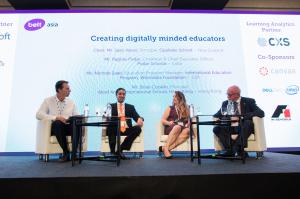Indian-origin educationists bat for ‘innovation’ at Bett Asia
Supported by Malaysia's Ministry of Education, the two day event was themed ‘cultivating global collaboration in education.
MUMBAI, INDIA, November 28, 2017 /EINPresswire.com/ -- In its 4th year of powering new ways of advancing education, Bett Asia, the world's leading education technology and leadership summit, held in Kuala Lumpur, Malaysia between Nov 15-16, brought together over 1700 key education policy makers, education leaders and decision makers from across the Asia Pacific region.One of the highlights of this years' Bett Asia summit was the huge turnout of the senior educationists of Indian origin such as Raghav Podar, Chairman, Podar World School, Dr Sunita Gandhi, President and co-founder for Global Education, India and Dr Deepa Raja, special education needs consultant, The Galaxy Education System, India, who spoke on a wide spectrum of issues pertaining to the education sector.
And India’s presence and emphasis on education was not missed. Supported by Malaysia's Ministry of Education, the two day event was themed ‘cultivating global collaboration in education.’
The Malaysian Education Minister Mahdzir Khalid agreed that the Bett Asia theme was consistent with his ministry’s objective of ‘gaining more innovative and less traditional ways’ of teaching. “We must widen the focus of our education system beyond examinations and discipline, re-conceptualise teaching and learning to maximise positive social transformation and innovation,” he said.
Raghav Podar, Educationist & Chairman- Podar World School spoke vehemently about teachers becoming an integral part of the innovation we need to see in the education system.
“Rather than focusing on creating digitally minded educators, we should focus on creating curious minded students. Children today are digital natives, they're born into this digital age and technology comes to them naturally. Hence, its all the more important that we implement the right infrastructure and training to provide teachers with the support they need to teach innovatively. Otherwise, the teachers will be playing catch up to the students’ technological skills,” said Podar.
There seemed to be a consensus that private schools have already begun to show a lot of innovation, and must therefore reach out to Government schools and work with them to make education its top priority.
A similar concern has been voiced by Dr Sunita Gandhi, who also attended Bett Asia. “India was the seat of learning once but along the way lost it somewhere and in the last 100 years is stuck thanks to the British gift to Indians who left behind a 10+2+3 system of education that produced clerks.”
Children make up 39% of our population. India has about 472 million children. This is much larger than even China, where only 17.7% of the population are children; partly due to their long-standing one child policy. In fact, India’s children alone are 1.5 times more than the population of the United States.
Indian educationists, who are dealing with the world’s largest population of school children, are looking to both innovation, digitisation and partnerships to be able to engineer a paradigm shift in education- a need of the hour.
Pooja K
The Network
9892864385
email us here
Legal Disclaimer:
EIN Presswire provides this news content "as is" without warranty of any kind. We do not accept any responsibility or liability for the accuracy, content, images, videos, licenses, completeness, legality, or reliability of the information contained in this article. If you have any complaints or copyright issues related to this article, kindly contact the author above.

